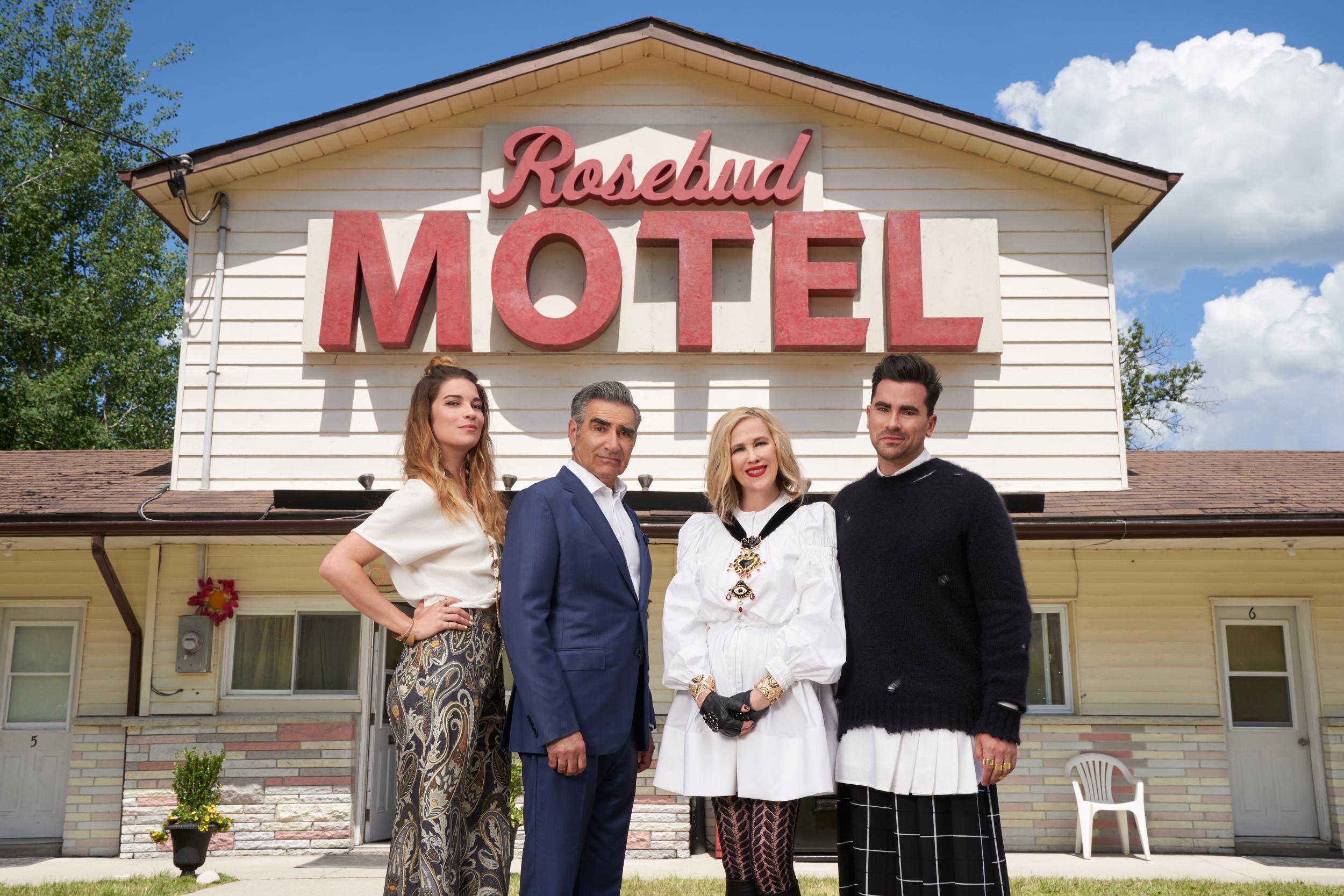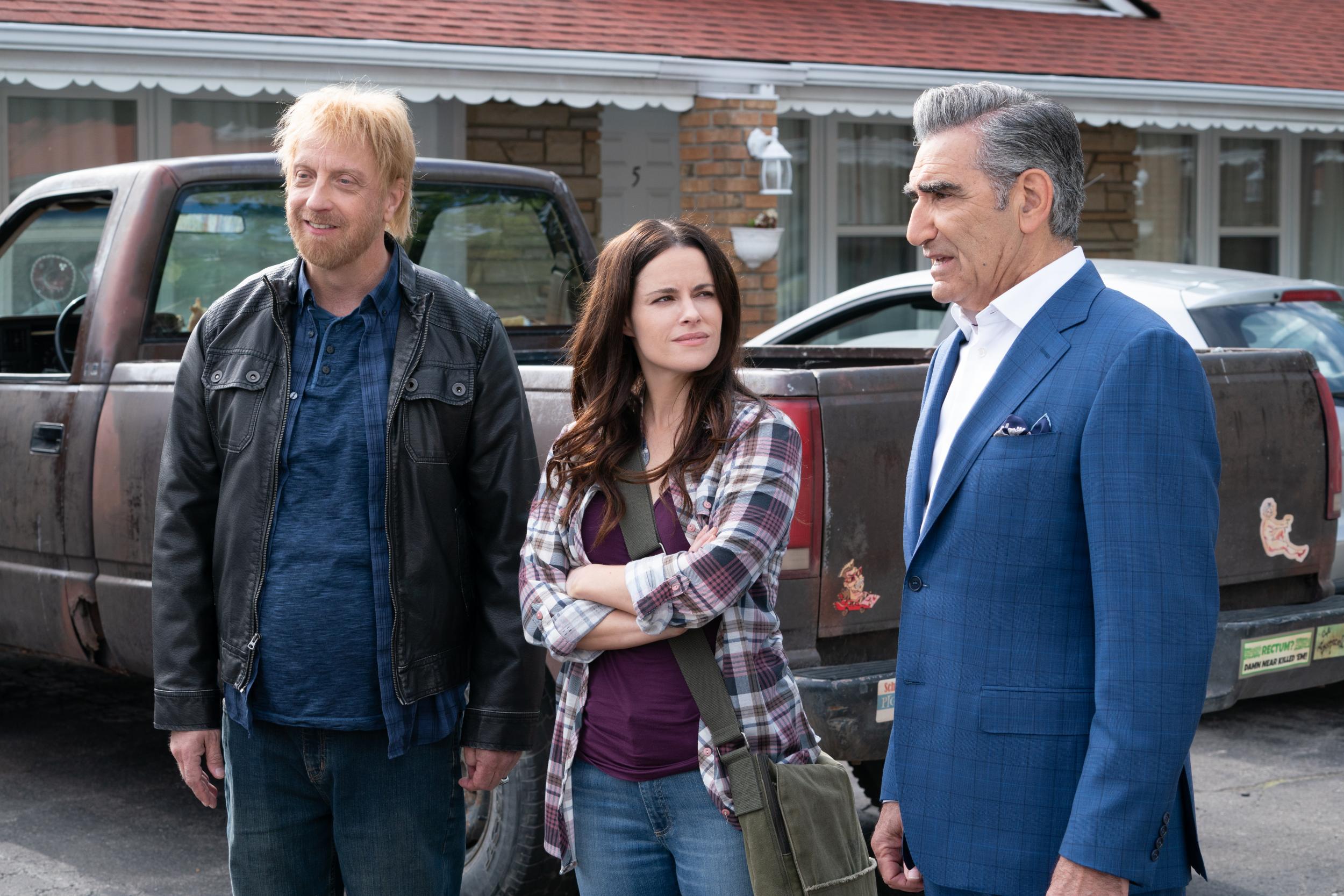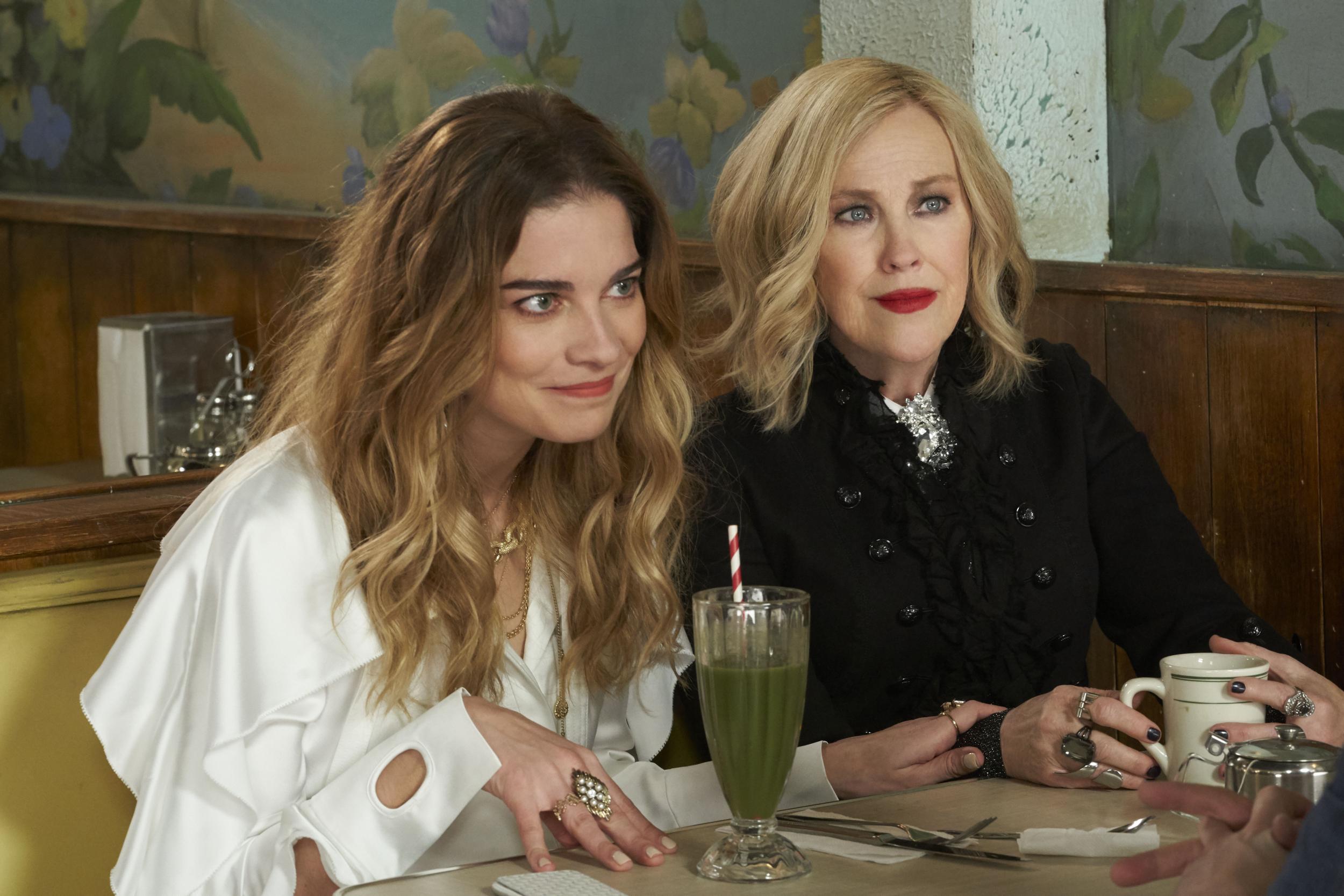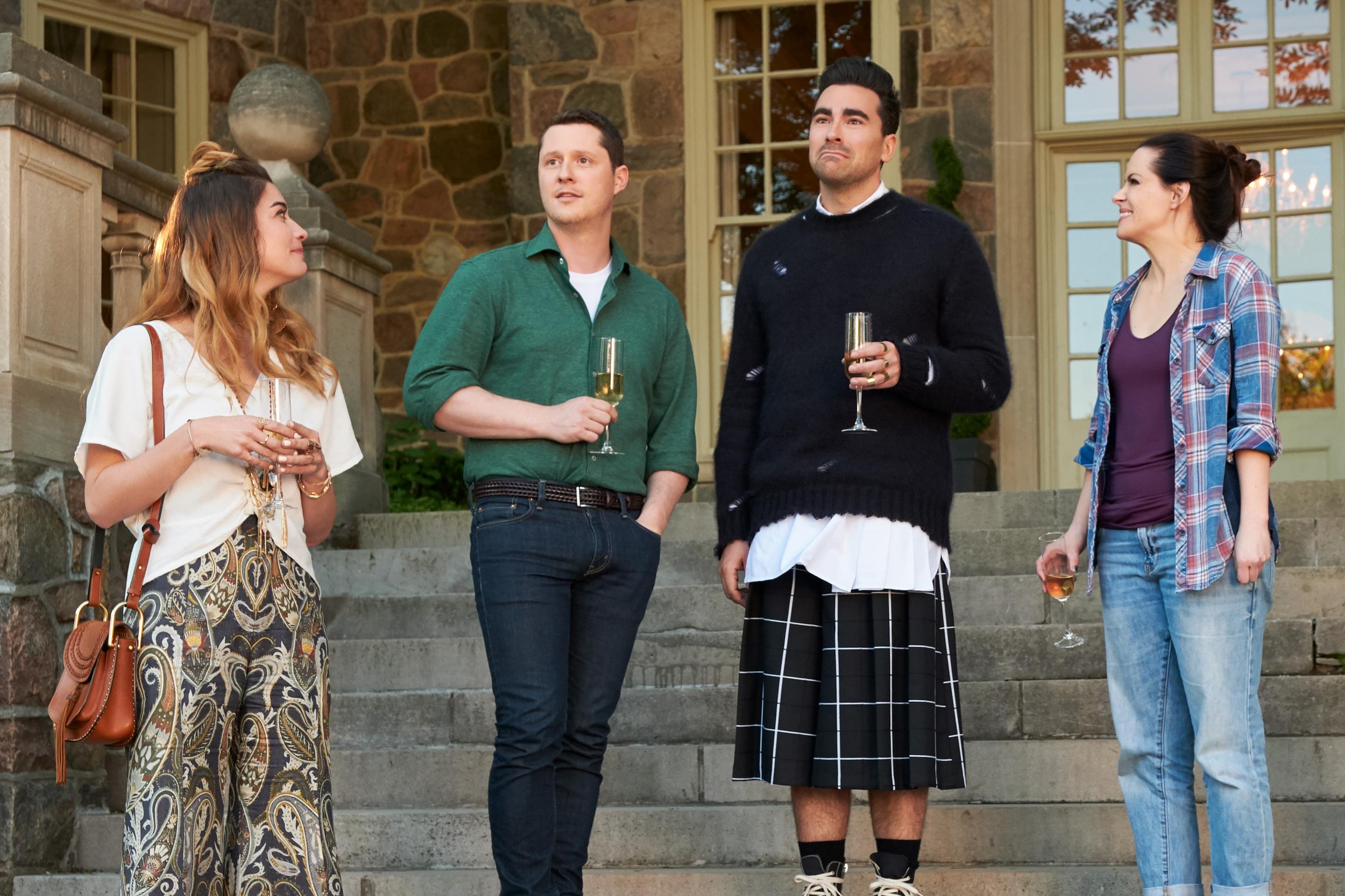‘We wept at the last table read’: Farewell Schitt’s Creek, the hit sitcom with a heart of gold
As the show’s sixth and final season arrives on UK Netflix, Alexandra Pollard speaks to the cast about the show’s humble beginnings and unexpected rise to fame


Your support helps us to tell the story
From reproductive rights to climate change to Big Tech, The Independent is on the ground when the story is developing. Whether it's investigating the financials of Elon Musk's pro-Trump PAC or producing our latest documentary, 'The A Word', which shines a light on the American women fighting for reproductive rights, we know how important it is to parse out the facts from the messaging.
At such a critical moment in US history, we need reporters on the ground. Your donation allows us to keep sending journalists to speak to both sides of the story.
The Independent is trusted by Americans across the entire political spectrum. And unlike many other quality news outlets, we choose not to lock Americans out of our reporting and analysis with paywalls. We believe quality journalism should be available to everyone, paid for by those who can afford it.
Your support makes all the difference.The world fell in love with Schitt’s Creek slowly and then all at once. When the sitcom began life in 2015, on a hard-to-find cable channel, with an off-putting title and a meagre budget, it didn’t exactly make a splash. Variety magazine sneered at its supposedly “juvenile” premise and “low-brow” humour. The New York Times called it “drab and underwritten”. Even those who liked it failed to notice its quietly radical agenda – how it offered up a small-town world in which homophobia wasn’t given oxygen; the way it juggled absurdity, wit and pathos like it was easy. It had “nothing at all of much importance”, shrugged the San Francisco Chronicle, “except a whole lot of laughs”.
And then, somewhere along the way, the show went from good to great to wonderful. And the tide began to turn. “Why aren’t you watching Schitt’s Creek yet?” asked New York Magazine in 2018. “Yes, Schitt’s Creek really is that good,” Vanity Fair chimed in a year later. As its season six swansong arrives on Netflix in the UK, the show has earned its rightful place in the pantheon of TV comedy. This is the little sitcom that could.
The ingredients were always there for something special. Created by a then-unknown Dan Levy and his American Pie star father Eugene, Schitt’s Creek had a simple set-up. A preposterously rich family of eccentrics – video store tycoon Johnny Rose (Eugene Levy), his former soap-star wife Moira (Catherine O’Hara), their foppish son David (Daniel Levy) and socialite daughter Alexis (Annie Murphy) – get busted for tax evasion and lose everything they own. Everything, that is, except a small town slap-bang in the middle of nowhere, bought by Johnny as a joke for his son’s birthday. So they up sticks and move to Schitt’s Creek, their fall from grace taking them from mansion to motel, from decadence to destitution. “Goodnight children,” says Moira on the family’s first night in adjoining motel rooms. “Let’s pray we don’t wake up.”
But as the show progresses, and the Roses find themselves embraced by a town they have only ever sneered at, so they are won over by its way of life. Moira joins the local singing group The Jazzagals. Johnny refurbishes the motel. Alexis becomes a PR. David opens a general store. Both siblings fall in love. It all plays out in a way that is at once subtle and panto-esque.
“On a very surface level, the show is about a wealthy family that loses their money,” says Dan Levy, who took the reins as sole showrunner in season two, “but that’s nothing more in the long run than a vehicle for exposing and revealing character. And I think the show, beneath the surface, was really an examination and an evaluation of love.”
Emily Hampshire, who plays apathetic motel manager Stevie, agrees. “It actually reminded me of those old Billy Wilder movies, like The Apartment and Irma la Douce, where it’s so funny, but the heart’s in it and the love. It’s because of these relationships that you can laugh at the horrible things they say to each other.”
And boy do they say horrible things. Alexis and David’s childish bickering – “You get murdered first,” they hiss at each other while arguing over who’ll take the bed nearest the door – is magnificent. So, too, is Moira’s utter lack of maternal spirit. Her son is a “disgruntled pelican”. She doesn’t remember her daughter’s middle name. “Alexis don’t be ridiculous,” she says when it’s suggested that David might be her favourite. “That’s exactly the kind of paranoia that makes me wary of spending time with you.”
But for all its acerbity, there is a vein of goodness running through the show. It’s there in David’s pursed lips as he tries to disguise a smile; in Johnny’s awkward moments of vulnerability; in Alexis’s brief flashes of generosity; and in Moira’s genuine delight in her children’s happiness. The more those traits broke through, and the more layers of entitlement were peeled away, the more the show’s following grew. In January 2017, the same month that Donald Trump assumed office, Schitt’s Creek landed on Netflix, offering a beacon of positivity at a time when it was most needed. Previously only broadcast on CBC in Canada and Pop TV in the US (which you had to flip through 273 channels to find), it suddenly had a potential audience of millions. Netflix is famously secretive about how many people watch its shows, but by the end of season five, viewing figures on Pop had increased by 1,100 per cent.
That’s when Hampshire noticed things start to change. “It was like a time when things were not amazing politically in America,” she recalls, “and all of a sudden, the show came back from our hiatus, I went into Bed Bath & Beyond, and it was a very different experience for me.” Since then, there have been Emmy nominations, comic con appearances and tours – on which they are met with a feverish, Beatlemania energy. Jennifer Lawrence grabbed O’Hara at an event to tell her she “effing loved” the show. Paul Rudd described Moira Rose as “quite possibly the greatest creation since the Mars rovers”.

Watch Apple TV+ free for 7 days
New subscribers only. £8.99/mo. after free trial. Plan auto-renews until cancelled

Watch Apple TV+ free for 7 days
New subscribers only. £8.99/mo. after free trial. Plan auto-renews until cancelled

“It’s like this cult of love – I think the goodness that it puts out really comes back to us,” says Murphy, whose Instagram follower count jumped from around 93 to more than half a million after the move to Netflix. “Daniel created a world that many of us want to live in,” agrees O’Hara. “He’s written a comedy with a secret love letter within. I wasn’t aware that we were doing anything but making the best, funniest show we could make. I’m so happy it’s had a positive effect on people beyond the great laughs.”
It is worth pausing here to talk about O’Hara. Known to a whole generation as Kevin’s mum in Home Alone (1990), and having starred in films such as Beetlejuice (1988) and Waiting for Guffman (1996), O’Hara was already a comedy powerhouse. Then came the role of “12-time daytime Emmy Award-attending actress” Moira Rose. As this emotionally unstable logophile with a bizarre, transatlantic accent and a vast collection of wigs, O’Hara puts in one of the most fantastically deranged performances in sitcom history, and has turned the word “baby” into an art form.
“The great joy of hiring Catherine is that she comes with an arsenal of ideas, all of which are so unique to her that you can’t even begin to concoct them yourself,” says Levy. “She came with a reference to [English socialite] Daphne Guinness, which was a really fun jumping off point for all of us. And then she asked if she could wear wigs. And then she asked if she could do a voice. And we said yes, and yes, and yes.” He laughs. “Obviously, you have a little bit of... you know... apprehension, just because you don’t know what you’re going to get, but with Catherine, there’s really no option to say no, because she’s just so good. And we were very lucky to have had her.”
“I have all the emails we exchanged before doing the series,” says O’Hara, who had worked with Eugene Levy on SCTV (the Canadian equivalent of SNL) in the Seventies, and on the 2000 mockumentary Best In Show. “I wasn’t yet sure of how I wanted to play Moira, but I had lots of ideas of how I didn’t want to play her. I recently reread those early emails and laughed at how I was already coming off like Moira and Eugene was the kind, caring and accommodating man Johnny would be. Moira’s a bit of an alien and I’m grateful I got to play her ridiculousness.”
And what about that accent? “I’m fortunate to have met some interesting people in my life and I hoarded some of their unique qualities, hoping they’d come in handy when I wanted to invent a fun character,” she says. “I drew on several women I’ve known for Moira, but I wasn’t impersonating any one person. ‘Aviatorrrr’ was a word Eugene would use, in his best Moira voice, to cue me if I was losing a bit of Moira in a scene. Sometimes, I would be more into what was happening between our characters and I’d peek through my Moira façade. Eugene would remind me who I was meant to be.”
“Literally, you never knew what was coming out of her mouth,” says Annie Murphy, who played Alexis. “Even just her pronunciation, she would just catch you off guard constantly. It was a real struggle to remain professional, and, you know, with a normal look on your face.”
Working with O’Hara and Levy senior was a dream come true for Murphy. “The second I saw Eugene Levy and Catherine O’Hara as names on the breakdown for the audition, I can’t even describe to you how desperately I wanted this role,” she says, “because those two are perfect people in my mind.”
That enthusiasm paid off. Murphy nailed the audition and landed the role of Alexis. A spoilt socialite with an endless array of outlandish stories – “I once dated this sultan’s nephew who was forbidden to talk to me or even look at me, and we made it work for like, half a regime change” – Alexis could easily have been, well, awful. “That’s the perfect word for it,” says Murphy with a chuckle. But beneath the patronising pout and meerkat stance, there was a sweetness to Alexis. A steeliness, too. “The breakdown, when I got the audition, was: ‘socialite, ditsy, blonde...’” says Murphy, “but then at the very, very end, and I think this really changed everything for me, was ‘a young Goldie Hawn’. Goldie Hawn could be described as flighty or ditsy or whatever, but she’s also this incredibly effervescent, smart, charming individual that people just gravitate towards without knowing exactly why. And so it was really important for me to paint Alexis as a fully fleshed-out human being, as opposed to just the stereotypical ‘dumb blonde’.”

“We knew from the get-go that we never wanted her to feel like a caricature of a socialite,” says Levy. “We wanted her to embody all the qualities that we’ve come to know from these popular socialites, but there had to be a warmth and a lightness in order to make that character last. When Annie came in, it was a done deal for me. She just had such a light to her. There’s such a sparkle, for lack of a better word, to her as an actor, that very few actors have. To me, it’s what makes a movie star. You look at the leading ladies of all the big romcoms and the reason there are so few of them, and the reason they have become so successful, is because they have that perfect alchemy as an actor. They have the ability to make people laugh, which is very hard, and they have the substance and the weight and the skill to also make people feel things way beyond comedy. And Annie just has that in spades.”
“Wow, that’s the nicest thing he’s ever said about me,“ says Murphy. “We just had this bizarre chemistry between the two of us. I felt confident for literally the first time ever in an audition room.”
Emily Hampshire felt the opposite. She hadn’t worked for a year, had $800 in her bank account and was midway through a divorce when she auditioned for the role of Stevie, Johnny’s business partner and David’s best friend. Though she had no idea that the disdainful desk clerk would become such a key character – “I really thought that Stevie was going to just be the girl who brought these people the towels and said a sarcastic comment every now and then” – that didn’t make her any less terrified. She was living in her friend’s walk-in closet, having just moved to LA, and her confidence was at rock bottom. “I would just break out in full body hives basically every time I walked into an audition,” she recalls. When her agent rang to tell her about the audition for Schitt’s Creek, she nearly didn’t go. “She’s like, ‘No, just go in the room. They’re Canadian, they’re nice.’” So she did. Not that she has any memory of the audition. “It was that traumatising. Apparently I did the audition and then I was like: ‘Oh my God, that’s the worst thing I’ve ever done,’ and I hid inside my shirt. Dan happened to find it charming. Most people won’t. He was like, ‘This girl is crazy and I like it.’” Landing the role changed her life. “I think for both Annie and I, our pre-Schitt’s life was rather s***. Ironic that a show called Schitt’s Creek changed our life for the better.”
In its own small way, the show has changed the lives of viewers, too. David’s pansexuality and his subsequent relationship with his business partner Patrick (Noah Reid) – “a business major that wears straight-legged, mid-range denim”, but David loves him anyway – is never once met with hostility. “From the beginning, Daniel had this mandate of two things,” says Hampshire. “The town of Schitt’s Creek and its people will never be the butt of a joke, and there will be no homophobia in Schitt’s Creek – it just doesn’t exist there.”
Even in season five’s “Meet the Parents” episode, when it transpires that Patrick is not yet out to his mother and father, there is only a brief flicker of conflict. His parents are not upset that their son is gay – “Oh my God, OK, for a minute I thought this was gonna get very dark,” says David – but at the thought that he felt like he couldn’t come and talk to them.
Reid was shocked at how much filming Patrick’s coming out affected him. “As we shot it, I knew that it was a significant moment not just for that character, but for so much of our fanbase,” he says. “I really wanted to do that justice, and as a straight guy, I was concerned that I wasn’t going to be able to. And on the day, I was just so struck by the feeling of fear. I felt I was putting myself in the shoes of this man I’ve been playing for two years, and he was having to explain to the people closest to him something about himself that was integral, that he was worried that they might not accept, the people that are supposed to know you the best and love you the most, that they might think of you differently, or turn on you or disregard you. I guess that was just something that I’ve never had to face, and so to be in the shoes of somebody who was doing that, it just totally changed me.”

Some critics suggested it was unrealistic for a tiny, unhip town in North America (we never find out exactly where the show’s set, but it’s filmed in Goodwood, Ontario, population 663) not to bat an eyelid at a same-sex relationship. But Levy, who is gay in real life, stuck to his guns. “That blew my mind and I thought it was such a maverick move from Dan,” says Hampshire. “Before this show, I would have thought that if you want to address homophobia, you show someone being homophobic and then they learn a lesson. But God, it’s so much smarter the way he did it. No one misses it.” What’s more, she adds, Stevie and David’s conversation about pansexuality early on in the show “kind of gave me an answer for my own sexuality”.
In a viral video, the cast of Schitt’s Creek were brought to tears by a thank you letter signed by 1,800 mothers of LGBT+ kids. “You have created new ways for queer viewers to see themselves represented,” read the letter, “and in its own way, that’s just as important as the battles we’re still fighting.”
“To hear that letter after six years of working on the show,” says Levy, “and getting the opportunity to depict the character that I’d never seen on TV before, was quite moving. I don’t think you set out to make content that’s gonna change people’s lives. We just set out to make a show that would hopefully make people laugh, and I think the more the seasons carried on, and the more I was able to tell stories about my experience and my community, the more I was made aware of the effect that was having on people. To know that our show has left behind some positive change in the world, and particularly in the families and friends and lives of the LGBTQ community, I honestly could not have asked for anything more.”
And so, Levy decided that it was time for the show to end – just as the show’s audience was at its largest, and just as it had finally found the mainstream success it deserved. “It would have been very easy for him to continue – people were offering him everything,” says Hampshire, “and so for him to stick to his guns and be like, ‘No, this is the way it should end,’ he was absolutely right.”
The final season is glorious – equal parts zany one-liners and existential catharsis. Johnny, Stevie and the town mayor Roland Schitt fly to New York with a business proposal. Alexis reaches a crossroad in both her relationship and her career. David gets married. And, most importantly of all, we finally see the trailer for Moira’s comeback movie, The Crows Have Eyes 3: The Crowening.
“I think the reality is that you’re never going to be able to tie everything up perfectly,” says Levy, “and I don’t really think that’s what life’s about. I think the joy of a series finale is a little bit of mystery while, at the same time, hopefully giving your audience everything they wanted and a little bit of something they didn’t know they wanted.”
I miss how feminine and confident – in a delusional way – I felt as Moira. Maybe I should just stay in character
Saying goodbye wasn’t easy. Not least because the cast had grown so close. “Literally everybody on set kind of fell in love with one another,” says Murphy. “I kind of prepared myself for some ego to be involved, because it was f***ing Eugene Levy and Catherine O’Hara. But the second I met them, I realised how very, very wrong I was to have anticipated any kind of ego at all. They’re just the most kind, down to earth, humble, fun, playful and caring human beings I’ve ever met in my life.”
“I feel like I grew alongside Stevie over the course of the series,” says Hampshire. “Stevie has this chosen family, and Schitt’s has been that for me too. My favourite quote is: ‘Just because it’s fiction, that doesn’t mean it’s not true.’ And that relationship is true. The relationship with Stevie and Mr Rose is a real relationship, and saying goodbye to that, and those kind of connections, is like a death. And I’m never gonna have those moments again.”
“We wept at the table read for the last two episodes,” says O’Hara. “We shared grateful tears. I miss how feminine and confident – in a delusional way – I felt as Moira. I miss having that kind of nerve and creativity with how I present myself. I miss the opportunity to use arcane words in my conversations... Maybe I should just stay in character.”
“I think you can probably see a little bit of Annie Murphy in there with Alexis Rose,” says Murphy of her final scenes, “because it was genuine. It was me saying goodbye to Eugene and Catherine, and Johnny and Moira, and it was a really, really hard and wonderful day. It’s something that will flash before my eyes as I’m dying I’m sure. It was a truly, truly perfect day.”
At least we can be grateful that Schitt happened. “It’s been quite emotional and overwhelming at times,” says Levy. “But what a gift. What an unexpected joy.”
Join our commenting forum
Join thought-provoking conversations, follow other Independent readers and see their replies
Comments